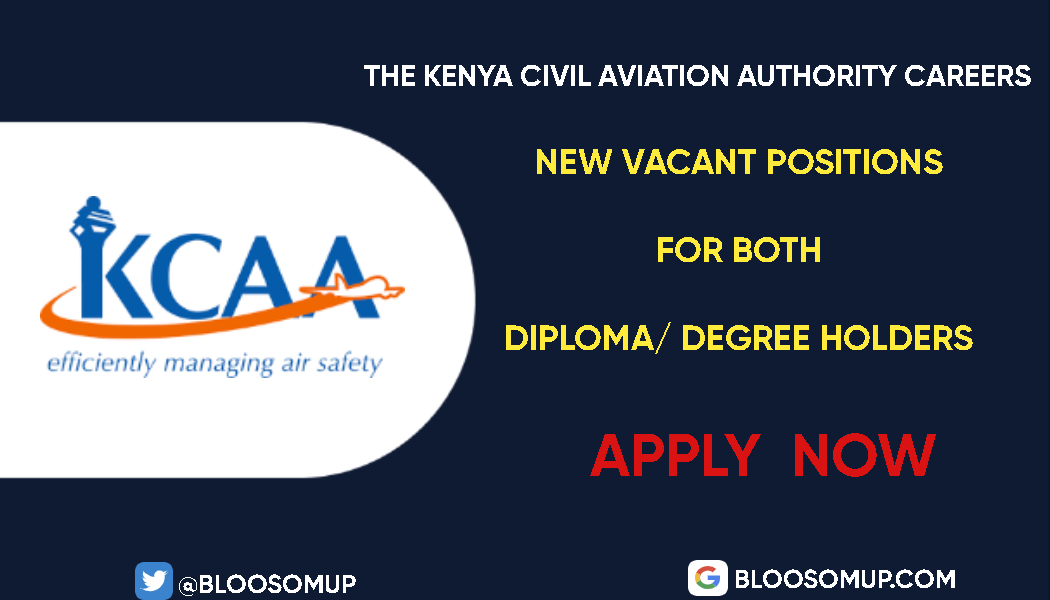Kenya Civil Aviation Authority (KCAA): Regulating Kenya’s Airspace (The Kenya Civil Aviation Authority Careers)
The Kenya Civil Aviation Authority Careers; jobs list:
1. Chief Accountant – Revenue
2. Chief Internal Auditor – Financial
3. Chief Airworthiness Inspector – Avionics
4. Flight Operations Inspector – Large & Medium Aircraft (7 Pos.)
(scroll down to find application process)
last updated on 20th, March 2025
Introduction
The Kenya Civil Aviation Authority (KCAA) is the regulatory body responsible for the safety, security, and oversight of civil aviation in Kenya. It plays a crucial role in ensuring the efficient and sustainable development of the aviation industry within the country. Established to comply with international aviation standards, KCAA oversees licensing, air traffic control, and the overall regulation of air transport services in Kenya.
Company Overview (The Kenya Civil Aviation Authority Careers)
- Name: Kenya Civil Aviation Authority (KCAA)
- Established: 2002
- Headquarters: Nairobi, Kenya
- Industry: Aviation Regulation and Air Traffic Management
- Parent Ministry: Ministry of Roads and Transport (Kenya)
- Regulatory Scope: Safety, security, economic regulation, and air navigation services
Mandate and Functions
KCAA operates under the Civil Aviation Act and is responsible for enforcing regulations that ensure the safety and security of Kenya’s airspace. Some of its key functions include:
1. Aviation Safety Oversight
KCAA ensures that all aviation operations in Kenya comply with international safety standards set by the International Civil Aviation Organization (ICAO). This includes:
- Issuing Air Operator Certificates (AOC) to airlines.
- Conducting safety inspections and audits.
- Monitoring compliance with airworthiness standards.
2. Air Traffic Control and Airspace Management
KCAA manages Kenya’s airspace by providing air navigation services, including:
- Controlling air traffic to prevent collisions and ensure efficient air travel.
- Managing flight paths for domestic and international airlines.
- Monitoring air traffic communications.
3. Licensing and Certification
To promote a safe aviation industry, KCAA is responsible for issuing licenses and certifications to:
- Pilots and aircrew.
- Aircraft maintenance engineers.
- Air traffic controllers.
- Aviation training institutions.
4. Economic Regulation of the Aviation Industry
KCAA monitors and regulates economic aspects of the aviation industry, ensuring fair competition and compliance with international standards. It oversees:
- Licensing of airline operators.
- Air transport services agreements.
- Tariff regulations for airlines and airports.
5. Aviation Security Regulation
The authority plays a key role in securing Kenya’s airspace by:
- Implementing international aviation security standards.
- Conducting airport security audits.
- Regulating baggage and cargo security protocols.
KCAA’s Role in Aviation Development
KCAA actively promotes the growth of Kenya’s aviation sector by:
- Facilitating the modernization of airports and infrastructure.
- Supporting the expansion of Kenya’s air transport industry.
- Collaborating with international aviation bodies such as ICAO, the African Civil Aviation Commission (AFCAC), and the East African Community Civil Aviation Safety and Security Oversight Agency (CASSOA).
Training and Capacity Building
KCAA operates the East African School of Aviation (EASA), which offers specialized training for aviation professionals, including pilots, engineers, air traffic controllers, and aviation safety officers. The institution is recognized globally for producing highly trained aviation experts.
Major Achievements and Milestones
KCAA has made significant strides in the aviation industry, including:
- Implementing modern air traffic control systems to enhance safety.
- Upgrading Kenya’s aviation infrastructure to meet international standards.
- Strengthening aviation security measures at major airports like Jomo Kenyatta International Airport (JKIA).
- Supporting the growth of Kenya Airways and other local carriers through regulatory compliance.
Challenges and Future Outlook
Despite its successes, KCAA faces challenges such as:
- Managing increased air traffic due to the growth of Kenya’s aviation industry.
- Ensuring compliance with evolving global aviation safety and security regulations.
- Addressing environmental concerns related to aviation emissions.
To address these challenges, KCAA is focusing on:
- Implementing new technologies for air traffic management.
- Strengthening partnerships with global aviation regulators.
- Enhancing training programs to produce highly skilled aviation professionals.
The Kenya Civil Aviation Authority Careers; Application process & Conclusion:
The Kenya Civil Aviation Authority (KCAA) is a vital institution in the country’s aviation industry. By ensuring safety, security, and efficient air navigation services, KCAA continues to enhance Kenya’s position as a key aviation hub in Africa. Through ongoing modernization, regulatory improvements, and capacity building, the authority is committed to fostering a safe and competitive aviation sector.
Submit your application
- The Director General
- Kenya Civil Aviation Authority
- Aviation House – JKIA
- P.O. Box 30163 – 00100
- NAIROBI
Disclaimer: This article is based on publicly available information about the Kenya Civil Aviation Authority. For official details and regulatory updates, visit KCAA’s official website at www.kcaa.or.ke.





